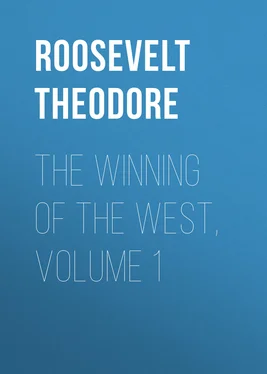Theodore Roosevelt - The Winning of the West, Volume 1
Здесь есть возможность читать онлайн «Theodore Roosevelt - The Winning of the West, Volume 1» — ознакомительный отрывок электронной книги совершенно бесплатно, а после прочтения отрывка купить полную версию. В некоторых случаях можно слушать аудио, скачать через торрент в формате fb2 и присутствует краткое содержание. Жанр: foreign_prose, История, foreign_edu, foreign_antique, на английском языке. Описание произведения, (предисловие) а так же отзывы посетителей доступны на портале библиотеки ЛибКат.
- Название:The Winning of the West, Volume 1
- Автор:
- Жанр:
- Год:неизвестен
- ISBN:нет данных
- Рейтинг книги:5 / 5. Голосов: 1
-
Избранное:Добавить в избранное
- Отзывы:
-
Ваша оценка:
- 100
- 1
- 2
- 3
- 4
- 5
The Winning of the West, Volume 1: краткое содержание, описание и аннотация
Предлагаем к чтению аннотацию, описание, краткое содержание или предисловие (зависит от того, что написал сам автор книги «The Winning of the West, Volume 1»). Если вы не нашли необходимую информацию о книге — напишите в комментариях, мы постараемся отыскать её.
The Winning of the West, Volume 1 — читать онлайн ознакомительный отрывок
Ниже представлен текст книги, разбитый по страницам. Система сохранения места последней прочитанной страницы, позволяет с удобством читать онлайн бесплатно книгу «The Winning of the West, Volume 1», без необходимости каждый раз заново искать на чём Вы остановились. Поставьте закладку, и сможете в любой момент перейти на страницу, на которой закончили чтение.
Интервал:
Закладка:
The country came into the possession of the British—not of the colonial English or Americans—at the close of Pontiac's war, the aftermath of the struggle which decided against the French the ownership of America. It was held as a new British province, not as an extension of any of the old colonies; and finally in 1774, by the famous Quebec Act, it was rendered an appanage of Canada, governed from the latter. It is a curious fact that England immediately adopted towards her own colonists the policy of the very nationality she had ousted. From the date of the triumphant peace won by Wolfe's victory, the British government became the most active foe of the spread of the English race in America. This position Britain maintained for many years after the failure of her attempt to bar her colonists out of the Ohio valley. It was the position she occupied when at Ghent in 1814 her commissioners tried to hem in the natural progress of her colonists' children by the erection of a great "neutral belt" of Indian territory, guaranteed by the British king. It was the role which her statesmen endeavored to make her play when at a later date they strove to keep Oregon a waste rather than see it peopled by Americans.
In the northwest she succeeded to the French policy as well as the French position. She wished the land to remain a wilderness, the home of the trapper and the fur trader, of the Indian hunter and the French voyageur. She desired it to be kept as a barrier against the growth of the seaboard colonies towards the interior. She regarded the new lands across the Atlantic as being won and settled, not for the benefit of the men who won and settled them, but for the benefit of the merchants and traders who stayed at home. It was this that rendered the Revolution inevitable; the struggle was a revolt against the whole mental attitude of Britain in regard to America, rather than against any one special act or set of acts. The sins and shortcomings of the colonists had been many, and it would be easy to make out a formidable catalogue of grievances against them, on behalf of the mother country; but on the great underlying question they were wholly in the right, and their success was of vital consequence to the well-being of the race on this continent.
Several of the old colonies urged vague claims to parts of the Northwestern Territory, basing them on ancient charters and Indian treaties; but the British heeded them no more than the French had, and they were very little nearer fulfilment after the defeat of Montcalm and Pontiac than before. The French had held adverse possession in spite of them for sixty years; the British held similar possession for fifteen more. The mere statement of the facts is enough to show the intrinsic worthlessness of the titles. The Northwest was acquired from France by Great Britain through conquest and treaty; in a precisely similar way—Clark taking the place of Wolfe—it was afterwards won from Britain by the United States. We gained it exactly as we afterwards gained Louisiana, Florida, Oregon, California, New Mexico, and Texas: partly by arms, partly by diplomacy, partly by the sheer growth and pressure of our spreading population. The fact that the conquest took place just after we had declared ourselves a free nation, and while we were still battling to maintain our independence, does not alter its character in the least; but it has sufficed to render the whole transaction very hazy in the minds of most subsequent historians, who generally speak as if the Northwest Territory had been part of our original possessions.
The French who dwelt in the land were at the time little affected by the change which transferred their allegiance from one European king to another. They were accustomed to obey, without question, the orders of their superiors. They accepted the results of the war submissively, and yielded a passive obedience to their new rulers. 14 14 In the Haldimand MSS., Series B, Vol. 122, p. 3, the letter of M. Ste. Marie from Vincennes, May 3, 1774, gives utterance to the general feeling of the creoles, when he announces, in promising in their behalf to carry out the orders of the British commandant, that he is "remplie de respect pour tout ce qui porte l'emprinte de l'otorité." [sic.]
Some became rather attached to the officers who came among them; others grew rather to dislike them: most felt merely a vague sentiment of distrust and repulsion, alike for the haughty British officer in his scarlet uniform, and for the reckless backwoodsman clad in tattered homespun or buckskin. They remained the owners of the villages, the tillers of the soil. At first few English or American immigrants, save an occasional fur trader, came to live among them. But their doom was assured; their rule was at an end forever. For a while they were still to compose the bulk of the scanty population; but nowhere were they again to sway their own destinies. In after years they fought for and against both whites and Indians; they faced each other, ranged beneath the rival banners of Spain, England, and the insurgent colonists; but they never again fought for their old flag or for their own sovereignty.
From the overthrow of Pontiac to the outbreak of the Revolution the settlers in the Illinois and round Vincennes lived in peace under their old laws and customs, which were continued by the British commandants. 15 15 State Department MSS., No. 48, p. 51. Statement of M. Cerre (or Carre), July, 1786, translated by John Pintard.
They had been originally governed, in the same way that Canada was, by the laws of France, adapted, however, to the circumstances of the new country. Moreover, they had local customs which were as binding as the laws. After the conquest the British commandants who came in acted as civil judges also. All public transactions were recorded in French by notaries public. Orders issued in English were translated into French so that they might be understood. Criminal cases were referred to England. Before the conquest the procureur du roi gave sentence by his own personal decision in civil cases; if the matters were important it was the custom for each party to name two arbitrators, and the procureur du roi a fifth; while an appeal might be made to the council superieur at New Orleans. The British commandant assumed the place of the procureur du roi, although there were one or two half-hearted efforts made to introduce the Common Law.
The original French commandants had exercised the power of granting to every person who petitioned as much land as the petitioner chose to ask for, subject to the condition that part of it should be cultivated within a year, under penalty of its reversion to "the king's demesnes." 16 16 Do .
The English followed the same custom. A large quantity of land was reserved in the neighborhood of each village for the common use, and a very small quantity for religious purposes. The common was generally a large patch of enclosed prairie, part of it being cultivated, and the remainder serving as a pasture for the cattle of the inhabitants. 17 17 State Department MSS., No. 48, p. 41. Petition of J. B. La Croix, A. Girardin, etc., dated "at Cohoe in the Illinois 15th July, 1786."
The portion of the common set aside for agriculture was divided into strips of one arpent in front by forty in depth, and one or more allotted to each inhabitant according to his skill and industry as a cultivator. 18 18 Billon, 91.
The arpent, as used by the western French, was a rather rough measure of surface, less in size than an acre. 19 19 An arpent of land was 180 French feet square. MS. copy of Journal of Matthew Clarkson in 1766. In Durrett collection.
The farms held by private ownership likewise ran back in long strips from a narrow front that usually lay along some stream. 20 20 American State Papers, Public Lands, I., II.
Several of them generally lay parallel to one another, each including something like a hundred acres, but occasionally much exceeding this amount.
Интервал:
Закладка:
Похожие книги на «The Winning of the West, Volume 1»
Представляем Вашему вниманию похожие книги на «The Winning of the West, Volume 1» списком для выбора. Мы отобрали схожую по названию и смыслу литературу в надежде предоставить читателям больше вариантов отыскать новые, интересные, ещё непрочитанные произведения.
Обсуждение, отзывы о книге «The Winning of the West, Volume 1» и просто собственные мнения читателей. Оставьте ваши комментарии, напишите, что Вы думаете о произведении, его смысле или главных героях. Укажите что конкретно понравилось, а что нет, и почему Вы так считаете.












